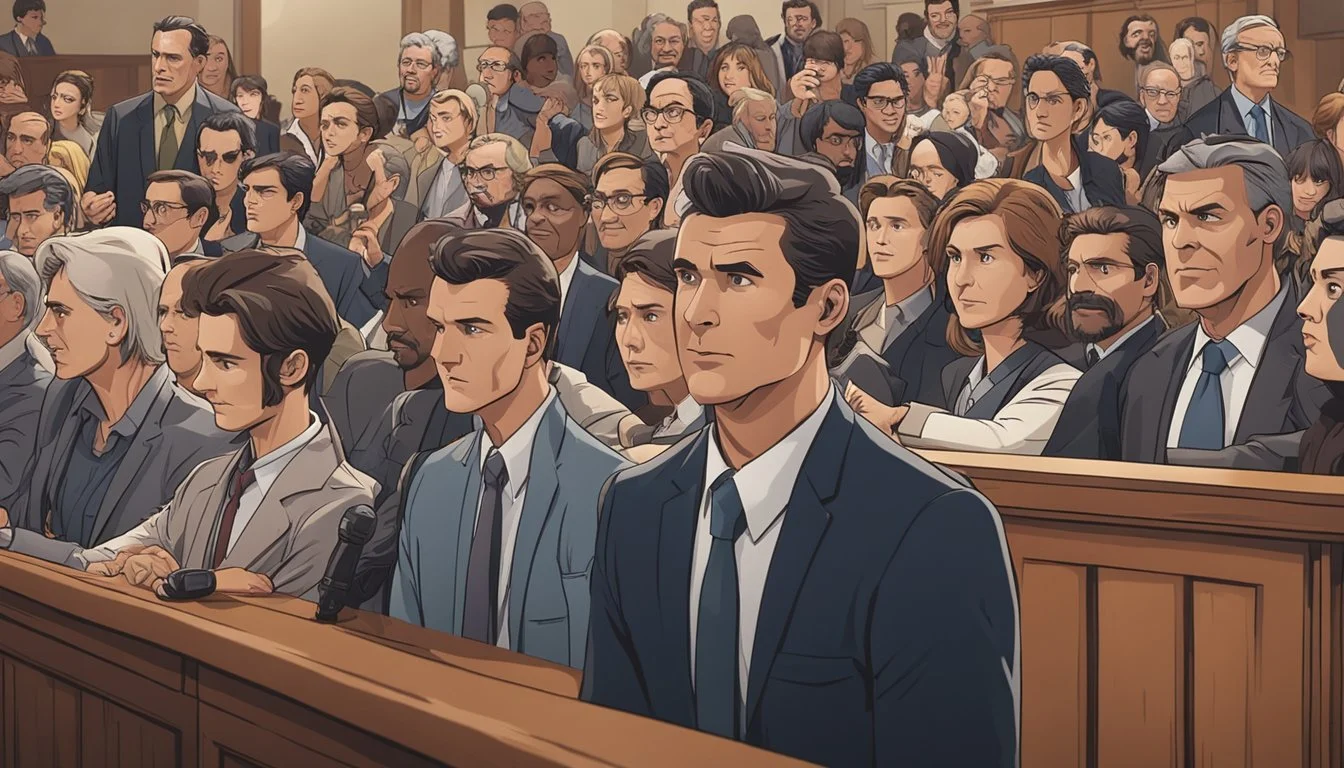5 True Crime Documentaries on Political Corruption in Illinois
Unveiling Shocking Scandals
Political corruption has long been a dark stain on Illinois' history, capturing not only state but also national attention over the years. The state has consistently provided a backdrop to numerous high-profile cases involving corrupt politicians, showcasing both the depth and persistence of systemic graft and bribery.
Documentaries focusing on political corruption in Illinois offer an unfiltered look into the mechanisms behind this persistent issue, providing viewers with real stories that spotlight the ethical failures of elected officials. These films often balance hard-hitting facts with engaging storytelling, making the complex web of corruption more accessible to the public. Through a blend of historical footage, expert commentary, and firsthand accounts, these true crime documentaries reveal the enduring challenges of governance in Illinois.
1) Operation Greylord (2020)
Operation Greylord is a documentary that dives into the investigation of corruption within the Cook County court system, primarily in the 1980s. The effort was spearheaded by the FBI, along with other agencies such as the IRS and the Chicago Police Department's Internal Affairs Division.
Terry Hake, a state prosecutor, played a key role by going undercover for the FBI. His efforts were crucial in exposing widespread corruption involving judges, lawyers, and court personnel.
The investigation led to numerous indictments, convictions, and sentences, revealing the extent of judicial misconduct in Chicago. It showcased the systemic issues within the legal institutions of the time.
To learn more about this documentary, you can visit IMDb.
2) Chicago: The Algonquin Sangamon Case
The Algonquin Sangamon Case is a detailed exploration of political corruption in Chicago's local government, focusing on allegations against several high-ranking officials. This documentary sheds light on how deep-rooted corruption can disrupt community trust and governance.
The documentary captures interviews with whistleblowers who risked their careers to expose unethical practices. Their accounts reveal the extent of the manipulation and deceit within the system.
Archival footage and official documents are used to back up claims, adding credibility to the narrative. The case involves significant financial embezzlement and manipulation of public resources for personal gain.
By highlighting the roles of specific individuals, it underscores how power dynamics can lead to systemic corruption. Viewers gain insight into the complex interactions between politicians and business interests.
The Algonquin Sangamon Case remains a significant piece for those interested in the impact of corruption on public institutions. It serves as a reminder of the importance of transparency and accountability in governance.
For more information on the film, you can visit the Wikipedia page or consult the film's listing on IMDb.
3) Lincoln's Law - The Case of the Clerk
Abraham Lincoln's career was not only defined by his presidency but also by key moments during his legal practice. One notable case involved a brutal murder that significantly boosted his national profile.
The victim in this case was a former law clerk of Lincoln's. The accused was the son of one of Lincoln's acquaintances. This case became a pivotal moment, showcasing Lincoln's legal acumen and ethical commitment.
Lincoln took on the defense, creating waves due to the high-profile nature of the crime. His defense strategy was meticulous and highlighted his skill in navigating complex legal landscapes.
This trial became a notable part of Lincoln's legal legacy, emphasizing his dedication to justice. It also contributed to the public's perception of Lincoln as a capable and principled lawyer.
For more on Abraham Lincoln and his involvement in notable legal cases, you can refer to the History article on Lincoln's murder trial.
4) Operation Silver Shovel
Operation Silver Shovel was a prominent FBI investigation targeting political corruption in Chicago during the 1990s. The probe unearthed illegal activities ranging from labor union corruption to drug trafficking and organized crime.
The investigation's central figure was John Christopher, an undercover informant with an extensive criminal background. He played a pivotal role in exposing corrupt city officials who accepted bribes for allowing illegal activities in their districts.
One crucial element of the probe involved a North Lawndale dump site, used as a focal point to entrap corrupt politicians. By the end of the investigation, 18 individuals were convicted, including six aldermen.
The lengthy three-and-a-half-year investigation highlighted the depth of corruption in Chicago's political landscape. It featured a series of undercover operations and secret recordings.
Operation Silver Shovel is remembered for its significant impact on cleaning up corruption in Chicago. The operation's revelations received widespread media coverage, adding to its notoriety and importance in political crime history.
For more information, visit Operation Silver Shovel on Wikipedia.
5) Blagojevich: American Greed (2024)
Rod Blagojevich, the former Governor of Illinois, became a notorious figure in American politics due to his corruption charges. The documentary Blagojevich: American Greed explores his dramatic rise and fall.
In 2008, Blagojevich was arrested for attempting to sell Barack Obama's U.S. Senate seat. This event marked the beginning of a highly publicized downfall.
The documentary illustrates Blagojevich’s criminal activities, which led to his impeachment and removal from office by the Illinois Senate in January 2009. His charges included corruption, mail fraud, and wire fraud.
Blagojevich served time in federal prison but had his sentence commuted in February 2020 by then-President Donald Trump. His story continues to intrigue and serves as a powerful example of political corruption.
Blagojevich: American Greed offers an in-depth look at his complex personality and the extent of his schemes. The documentary highlights interviews, legal documents, and insights from those involved.
For more information, visit Blagojevich on Wikipedia.
Historical Context of Political Corruption in Illinois
Illinois has a notorious history of political corruption, impacting both the state's political landscape and its governance. This section explores key figures and significant scandals, as well as their impact on state legislation.
Key Figures and Scandals
Rod Blagojevich, former Illinois governor, remains one of the state's most infamous political figures. In 2008, he was arrested and later convicted for attempting to sell Barack Obama's vacant Senate seat.
The Operation Greylord in the 1980s unearthed widespread judicial corruption. Over 90 officials, including judges and lawyers, were indicted for bribery and racketeering.
George Ryan, another governor, faced charges in 2006, convicted of fraud and racketeering linked to issuing licenses for bribes. His case highlighted deep-seated corruption within state government.
Impact on State Legislation
Corruption scandals have led to significant legislative changes aimed at increasing transparency and accountability. The Illinois Governmental Ethics Act was strengthened, requiring public officials to disclose financial interests more rigorously.
In response to the Blagojevich scandal, Illinois implemented stricter campaign finance laws. Contribution limits were established to curb undue influence from wealthy donors.
The Judicial Inquiry Board was empowered to investigate judicial misconduct more effectively following Operation Greylord. These reforms aimed to restore public trust and ensure fair judiciary practices.
Legislative initiatives also focused on protecting whistleblowers and improving oversight of contracting processes. These measures were critical in addressing systemic issues and attempting to break the cycle of corruption.
Common Themes in True Crime Documentaries on Political Corruption
True crime documentaries on political corruption often highlight a few recurring themes that shed light on the intricate nature of these scandals.
Abuse of Power
Political figures frequently exploit their authority for personal gain. This misuse of power often leads to substantial financial, social, and ethical repercussions.
Bribery and Fraud
Bribery and fraudulent activities are common motifs. Politicians may receive illicit payments to influence decisions, contracts, or policies, undermining the principles of public service.
Cover-ups and Conspiracy
Many documentaries reveal elaborate cover-ups where officials go to great lengths to conceal their wrongdoings. This can involve falsifying documents, manipulating evidence, or pressuring witnesses.
System Failures
The failure of oversight mechanisms is another prevalent theme. Weak or compromised systems allow corruption to flourish, often highlighting the need for reform in regulatory and enforcement agencies.
Impact on Society
These documentaries also explore the broader impact of corruption on communities, including economic disparities, loss of public trust, and social injustice.
Here is a list of some true crime documentaries focusing on political corruption:
The Governor's Scandal - An exploration of a governor’s misuse of funds for personal expenditures.
Corruption in Chicago - A deep dive into historical and modern corruption in Illinois politics.
White Collar Crimes: The Politicians - Investigating how high-ranking officials exploit their positions.
Bribes for Bills - The story of legislative corruption driven by special interest groups.
Pay to Play - Examining the intersection of political contributions and legislation.
By focusing on these themes, documentaries provide a critical look into the mechanics and consequences of political corruption.
Analysis of Documentary Filmmaking Techniques
Examining documentaries on political corruption reveals distinct methods filmmakers use to capture and convey their subjects. These techniques often include strategic interview methods and extensive use of archival footage, each contributing to a comprehensive narrative.
Interview Methods
Interviews in true crime documentaries on political corruption serve as crucial narrative devices. Filmmakers often secure interviews with whistleblowers, investigative journalists, and experts for deep insights.
They use direct questioning to reveal complex layers of corruption. The Panama Papers documentary is a notable example, featuring interviews with journalists who unearthed the financial schemes.
By filming in various settings, such as offices or public locations, creators add authenticity and context, presenting viewers with a clearer understanding of the events.
Use of Archival Footage
Archival footage provides historical context and visual proof in these documentaries. From old news broadcasts to internal government files, these clips validate claims and highlight the scope of corruption.
In the case of the Panama Papers, footage of financial documents and past political statements was pivotal. Such material allows viewers to see the evolution of corruption and its impact over time.
Careful selection and editing of archival footage enhance narrative flow, making complex information digestible and engaging. This blend of past and present elements sustains viewer interest and credibility.





